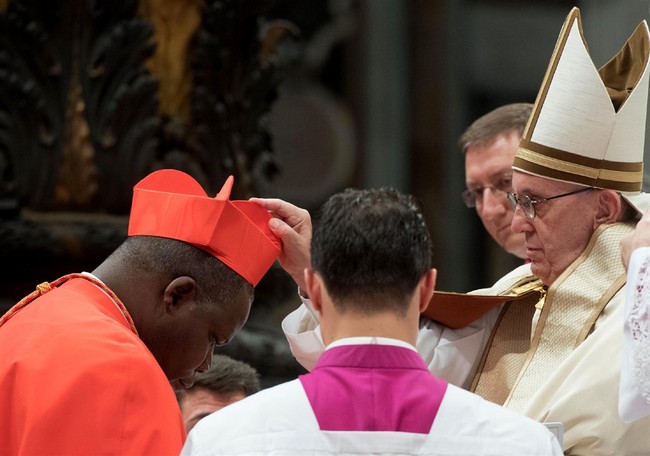
In which I come not to bury the Gray Lady, but to — well, not praise it so much as to take it seriously and respectfully. This is actually a good question, although it’s hardly the question for the upcoming conclave at the Vatican. Not only is it a good question, but Elian Peltier offers a pretty good analysis of what that might mean for the church.
As the cardinal-electors have begun to assemble for the process of electing a new pope, I have written about the potential influence of the electors from Africa and south Asia, especially India. The growth of the church in those areas far outstrips other regions, as Peltier notes at the New York Times, which will carry some significance in the discernment process of the conclave. But it also carries some other significance as well:
Francis’ legacy in Africa is mixed, with some crediting him for adapting church teachings to African customs and others saying his messages at times felt out of touch with the diverse and strongly held beliefs that animate many African societies.
On same-sex marriage and divorce, Francis’ blessing of same-sex couples faced a strong rebuke from African bishops and many Catholics in countries where homosexuality remains criminalized, stigmatized or taboo. The resistance from African bishops highlighted their growing influence within the church, observers say.
“Pope Francis had a certain solidarity with Africa, and I think his teachings on social issues were appreciated,” said Father Giulio Albanese, an Italian missionary who worked in Uganda in the 1980s and accompanied Francis on two trips to Africa. “But sometimes the openness of the people is not accepted by the bishops.”
That’s a rather uncharitable way to put it, especially when looking at the conflicts facing the African dioceses. This came up in the Synod on the Family in 2014, which I covered from the Vatican press room. The main ambition for Pope Francis in that synod was to develop more flexibility in the approach to reaching out to non-traditional families to offer the Gospel. The Western media reported on that from a mistaken impression that Francis’ flexibility was a call to change doctrine on family life. It led to all sorts of bad reporting that presumed Francis would allow same-sex marriage and would also allow divorce and remarriage, the former of which was not on the table at all, and the latter of which was mainly of interest to the German bishops.
The African bishops objected to any lack of clarity, and they objected publicly and firmly. The African churches have suffered actual martyrdom for decades and especially lately in defending Catholic doctrine, and they wanted firmness and clarity rather than ambiguity. The same is true to a lesser degree in south Asia, but doctrine on family life is particularly at issue in Africa, where polygamy is still practiced and where Western ideas of sexual freedom face violent opposition. “Openness of the people” wasn’t the issue, then or now; murdered priests and bishops, not to mention massacres of the Catholic laity, was the issue.
Peltier aptly sums up the potential change an African pope might portend, after running through a few papabili:
The election of an African pope would most likely usher in an era of conservatism, in line with the traditional views of many African Catholics.
That seems very plausible to me as well, especially after hearing from the African bishops at the Synod (and talking with a couple of them myself). They wanted more doctrinal precision and a muscular effort to press home Catholic teachings on the family, as well as a welcoming and evangelical spirit to promote it.
However, even if the conclave doesn’t elect an African pope, it’s likely that the cardinal-electors from Africa will push for that model of pontiff in the election. How much that might influence the conclave is debatable; 18 electors will be from Africa in a 135-elector conclave. The numbers alone would not drive a final choice, but that’s a significant number that could influence the discernment. And the desire for more doctrinal precision and clarity, especially on family doctrines, is likely not limited to Africa and south Asia either.
Of course, these issues are only a part of a larger set with which the cardinal-electors will contend. From other reports, another potential point of focus is to bring greater unity to the Catholic Church, after a papacy that opened up some significant divisions. At least one cardinal-elector emphasized unity in remarks to reporters at the Vatican this week, and one imagines that unity will be modeled in and after the conclave, if not explicitly discussed and discerned during it. Unity in this case may be addressed in any debate over doctrinal precision and the balance of it with the desire to carry on Francis’ pastoral approach to evangelization.
Again, one does not need to elect an African pope to address these issues. Still, the conclave will likely listen to the regions where the evangelization has been most successful — and faces the greatest risks to the faithful. Stay tuned.












